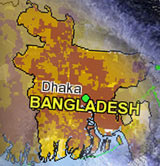Police foil protests by Islamists over gender issue in Bangladesh
 Dhaka- Hundreds of policemen and paramilitary border guards foiled a planned demonstration by militant Islamists in central Dhaka Friday after weekly Juma prayers against a proposed women's development policy of the interim government, officials and witnesses said.
Dhaka- Hundreds of policemen and paramilitary border guards foiled a planned demonstration by militant Islamists in central Dhaka Friday after weekly Juma prayers against a proposed women's development policy of the interim government, officials and witnesses said.
More than 400 riot police took control of the main entrance to the national Baitul Mukarram mosque as militants called on the Muslim worshippers over loudspeakers to join a protest rally after the congregation.
Witnesses said police used batons and rifle butts to stop a small group of militant clerics from the Islamic Constitutional Movement and student activists of the madrassas
(Islamic schools) from assembling before the huge state-run mosque.
The Islamists have been calling for the outright cancellation of the state policy on gender which proposes equality in the rights of men and women including the right of inheriting ancestral property.
"The granting of equal rights of inheritance violates the provisions of the holy Koran which proclaims that the women will get half the value of what their male counterparts inherit," said a senior cleric Zainul Abedin.
Abedin, who runs a local madrassa, and his other colleagues are rigid on their demand to scrap the policy which they call anti- Koranic.
Bangladesh is a Muslim majority country but most of its laws are secular as part of a colonial heritage, but Islamists are now demanding a change.
M A Matin, Home Affairs Adviser in the army backed government, has warned the Islamic militants of tough measures against the recurrence of last Friday's violence at the national mosque which left over 50 injured.
Over 200 border guards were also seen deployed around the mosque beefing up security.
At least 17 people were arrested during last week's riots while protesters torched cars and buses and attacked wayside shops and businesses in the capital city.
The Islamists had given time until Thursday (April 17) to the government to annul the gender policy or face tougher protests ahead. (dpa)